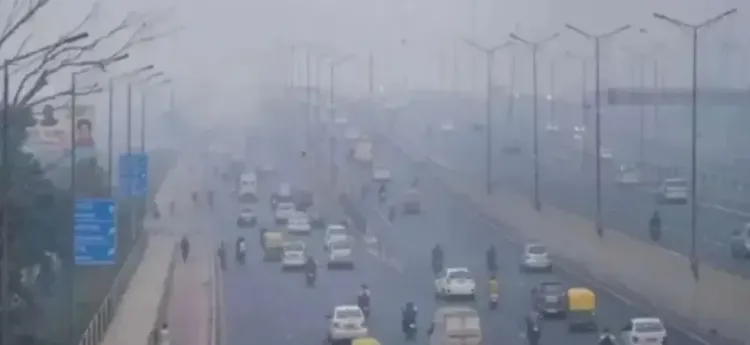Delhi's Air Quality Hits 'Severe' Levels Again, Schools Transition to Hybrid Learning

New Delhi, Dec 17 (NationPress) On Tuesday morning, Delhi was enveloped by a dense layer of smog, causing the air quality to fall back into the "severe" category and significantly impairing visibility throughout the city.
The combination of dropping temperatures and decreased wind speeds has led to a spike in pollution levels, prompting an urgent response from local authorities.
At 6 a.m. on Tuesday, the Air Quality Index (AQI) showed alarming figures at several key monitoring locations: 465 in Anand Vihar, 456 in Ashok Vihar, 447 at DTU, 443 at ITO, 412 near Jawaharlal Nehru Stadium, and 427 at RK Puram. Overall, the capital’s AQI was reported at 401 on Monday night, marking a significant increase from 294 on Sunday and 193 on Saturday, indicating a sharp decline in air quality within just two days.
Experts have linked this sudden escalation to a notable decrease in wind speed, which has allowed local pollutants to accumulate in the atmosphere. Predictions indicate that air quality will likely remain within the "very poor" to "severe" categories in the upcoming days due to ongoing unfavorable meteorological conditions.
In response to the deteriorating situation, the Commission for Air Quality Management (CAQM) activated Stage 4 of the Graded Response Action Plan (GRAP) late Monday evening after an emergency meeting. Earlier, Stage 3 measures had been put in place during the day but were found to be inadequate as pollution levels continued to rise.
Under the Stage 4 emergency measures, all school classes, except for grades 10 and 12, in Delhi and the surrounding NCR districts will now transition to a “hybrid” learning format, combining online and offline classes. The Directorate of Education (DoE) had previously instructed primary schools to adopt hybrid learning during Stage 3.
The Central Pollution Control Board (CPCB) categorizes an AQI above 400 as "severe," indicating significant health risks for all residents. Authorities have emphasized the need for strict enforcement of anti-pollution initiatives and have advised residents, particularly those in vulnerable groups, to minimize outdoor activities.
As winter deepens and pollution levels escalate, Delhi faces an ongoing struggle against smog, which remains a critical issue.









